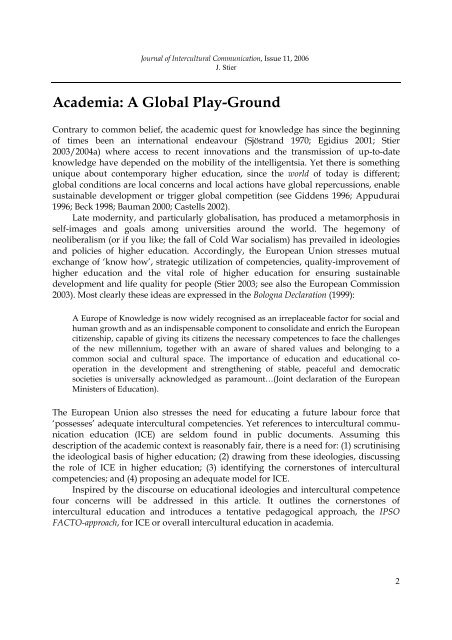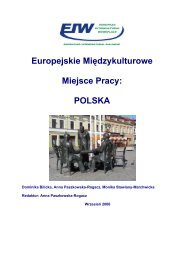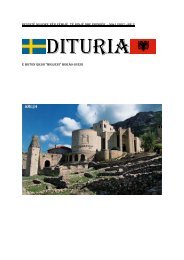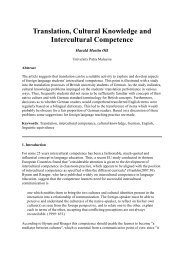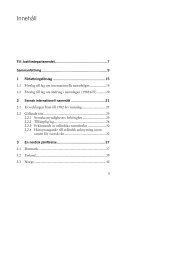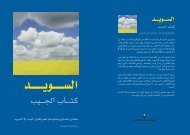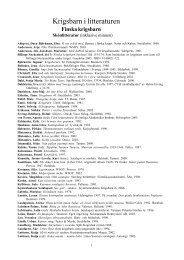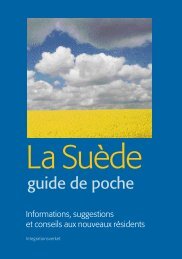Internationalisation, intercultural communication and intercultural ...
Internationalisation, intercultural communication and intercultural ...
Internationalisation, intercultural communication and intercultural ...
You also want an ePaper? Increase the reach of your titles
YUMPU automatically turns print PDFs into web optimized ePapers that Google loves.
Journal of Intercultural Communication, Issue 11, 2006<br />
J. Stier<br />
Academia: A Global Play-Ground<br />
Contrary to common belief, the academic quest for knowledge has since the beginning<br />
of times been an international endeavour (Sjöstr<strong>and</strong> 1970; Egidius 2001; Stier<br />
2003/2004a) where access to recent innovations <strong>and</strong> the transmission of up-to-date<br />
knowledge have depended on the mobility of the intelligentsia. Yet there is something<br />
unique about contemporary higher education, since the world of today is different;<br />
global conditions are local concerns <strong>and</strong> local actions have global repercussions, enable<br />
sustainable development or trigger global competition (see Giddens 1996; Appudurai<br />
1996; Beck 1998; Bauman 2000; Castells 2002).<br />
Late modernity, <strong>and</strong> particularly globalisation, has produced a metamorphosis in<br />
self-images <strong>and</strong> goals among universities around the world. The hegemony of<br />
neoliberalism (or if you like; the fall of Cold War socialism) has prevailed in ideologies<br />
<strong>and</strong> policies of higher education. Accordingly, the European Union stresses mutual<br />
exchange of ‘know how’, strategic utilization of competencies, quality-improvement of<br />
higher education <strong>and</strong> the vital role of higher education for ensuring sustainable<br />
development <strong>and</strong> life quality for people (Stier 2003; see also the European Commission<br />
2003). Most clearly these ideas are expressed in the Bologna Declaration (1999):<br />
A Europe of Knowledge is now widely recognised as an irreplaceable factor for social <strong>and</strong><br />
human growth <strong>and</strong> as an indispensable component to consolidate <strong>and</strong> enrich the European<br />
citizenship, capable of giving its citizens the necessary competences to face the challenges<br />
of the new millennium, together with an aware of shared values <strong>and</strong> belonging to a<br />
common social <strong>and</strong> cultural space. The importance of education <strong>and</strong> educational cooperation<br />
in the development <strong>and</strong> strengthening of stable, peaceful <strong>and</strong> democratic<br />
societies is universally acknowledged as paramount…(Joint declaration of the European<br />
Ministers of Education).<br />
The European Union also stresses the need for educating a future labour force that<br />
‘possesses’ adequate <strong>intercultural</strong> competencies. Yet references to <strong>intercultural</strong> <strong>communication</strong><br />
education (ICE) are seldom found in public documents. Assuming this<br />
description of the academic context is reasonably fair, there is a need for: (1) scrutinising<br />
the ideological basis of higher education; (2) drawing from these ideologies, discussing<br />
the role of ICE in higher education; (3) identifying the cornerstones of <strong>intercultural</strong><br />
competencies; <strong>and</strong> (4) proposing an adequate model for ICE.<br />
Inspired by the discourse on educational ideologies <strong>and</strong> <strong>intercultural</strong> competence<br />
four concerns will be addressed in this article. It outlines the cornerstones of<br />
<strong>intercultural</strong> education <strong>and</strong> introduces a tentative pedagogical approach, the IPSO<br />
FACTO-approach, for ICE or overall <strong>intercultural</strong> education in academia.<br />
2


